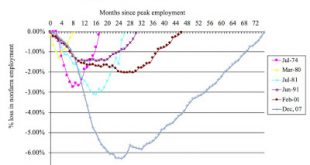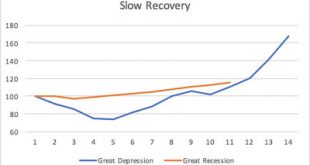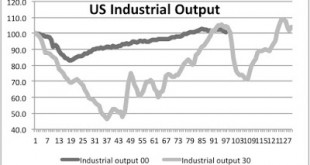It has been almost ten years since: Bear Stearns folded Lehmann collapsed of its own free will I posted on this blog All of the above Those who guessed “c” or “d” are optimists. Those who are expecting a long series of posts dwelling on the correct answer of “b” (with some references to “a” and AIGFP) will not be disappointed. But this is an introduction. I have been trying to think of how to simplify ten years of lessons as if there were one root cause....
Read More »Employment losses in historical perspective
My colleague Chris Magee sent this graphs around about employment losses during different recessions. The first one below show all the recession from the 1970s onwards. The next one, which I modified to show just the Great Recession and the Great Depression, is below, and gives a sense of the dimension of the Depression. The sheer size of the Depression is impressive. Even though the last recession is an outlier, it pales in comparison with the Great Depression. You can see in the graph...
Read More »Robert Skidelsky — How [Conventional] Economics Survived the Economic Crisis
How did conventional economics survive the crisis? Handwaving.Criticism of Paul Krugman and New Keynesian economics, which is based on "rational behavior and market equilibrium as a baseline" (Krugman).Skidelsky concludes, "Macroeconomics still needs to come up with a big new idea." I would rephrase that as "a new big idea." Theories are based on a "big idea" that constitutes the architecture of the framework. Rationality and equilibrium isn't it.Project SyndicateHow [Conventional]...
Read More »The slow recovery in historical perspective: 10 years after the Great Recession
It's hard to believe, but it has been almost a decade since the Great Recession. The official recession started in December 2017, but everybody remembers the collapse of Lehman in September of 2008. When you look at the recovery from the last recession in historical perspective, two things are clear. If you take GDP fall, or increase in unemployment, the Great Recession does not compare to the Great Depression, and that means that fiscal policy (automatic stabilizers and stimulus package)...
Read More »The Great Depression and the Great Recession compared
So I teach a course on the two (old syllabus here). One of the initial classes looks at Eichengreen and O'Rourke's comparison of the two events, and how, even though at the beginning the shock seemed similar, the recovery has been faster the second time. O'Rourke had noticed in his blog last year that the current recovery started way before, but has been so slow that now the 1930s look better when industrial output (rather than GDP) is used as a measure. Below the same data for the US...
Read More » Heterodox
Heterodox



